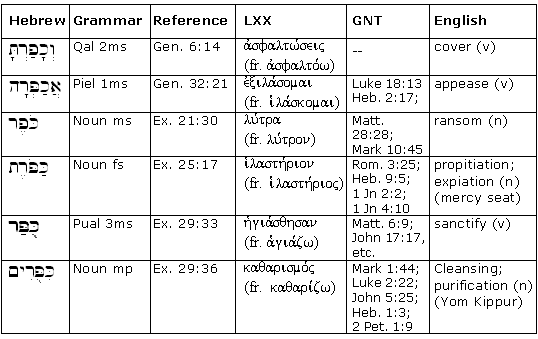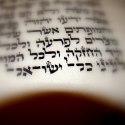|
The study of the sacrificial system of ancient Israel involves understanding various theological concepts, including holiness (kedushah), purity and impurity, offerings (korbanot) and sacrifices (zevachim), the nature of atonement (kapparah), forgiveness (selichah), and so on. Part of the difficulty of such a study is discovering how the writers of the New Testament might have understood these matters in relation to the ministry of Yeshua. Scholars have attempted to link words and concepts expressed in the Torah with those of the New Testament by means of the ancient "Greek Old Testament" (i.e., the Septuagint) that was translated some 200 years before the birth of Yeshua. The assumption is that because the New Testament was written in ancient Greek, when we investigate whether it references a Torah concept (such as "atonement"), we need to first check to see how the Septuagint translated the Hebrew and then compare that with the New Testament usage. This can be a helpful approach, of course, since in some cases the New Testament writers appear to directly quote from the Septuagint.
To give you some idea of what's involved, let's consider the word "atonement." First we need to identify all instances of the Hebrew root (כ-פ-ר) in the Torah and note how the Septuagint translates these instances. Often there is not a one-to-one correspondence between the Greek and the Hebrew, so we need to discover the most commonly used Greek word used to translate the Hebrew (we also need to check to see if the Greek root is used in any other ways in the Septuagint). Second, we see if the Greek New Testament uses the same word (or root) used in the Greek Old Testament. (Note that we can also go through this process the other way around: We can look up the Greek word in the New Testament to see if it's used in the Greek Old Testament, and then compare that with the original Hebrew). To make matters a bit more complicated, with regard to New Testament usage, we often have to look for cognates of the Greek root used in the Old Testament.
Here is a simple table illustrating just a bit of the process:
 |
Of course in order to be valid, this sort of textual comparison assumes that the translators of the Torah understood Hebrew perfectly (a claim that Jewish tradition disputes), and it further implies faith that the Greek Old Testament is divinely inspired... However, it is often unclear why the Greek translators used different Greek words for Hebrew words that clearly share a common root. For example, the Hebrew verb kafar (כָּפַר) is generally translated as "to cover," "to appease," or to "wipe clean." In verses that are not connected with the sacrificial system, it can mean covering the ark of Noah with pitch (Gen. 6:14), appeasing the anger of Esau (Gen. 32:20), or turning away the displeasure of a king (Prov. 16:14). Connected to the sacrifices, kafar refers to wiping away, "blotting out," or cleansing from sin (Lev. 1:4; 4:20,26). Pertaining to Yom Kippur, the Day of Atonement, kafar is primarily used to refer to cleansing sins from the Sanctuary (mikdash), since this was regarded as the place where sins were covered until they were symbolically sent away by the scapegoat. In the New Testament, the verb most closely associated with kafar is hilaskomai (ἱλάσκομαι), usually translated as "to atone," "to propitiate," and so on in English. It occurs only twice in the New Testament (Luke 18:13; Heb. 2:17) though in the Septuagint it is used to refer to God turning away his anger in forgiveness (Exod. 32:14; Psalm 25:11).
Similarly, the Hebrew word for the cover of the Ark of the Covenant is the kapporet (כַּפּרֶת), but the Greek word used to translate this word (ἱλαστήριος) implied the idea of cleansing more than the idea of "covering." The New Testament picks up the Greek usage and refers to the kapporet as hilasmos (ἱλασμός), a word that refers to an atoning sacrifice. Paul used this word to refer to Yeshua as the "place of atonement" in Romans 3:25.
Here is one more example. The Apostle Paul wrote, "The Messiah loved us and gave himself up for us, a fragrant offering and sacrifice to God" (Eph. 5:2). The Greek word Paul used for "offering" is prosfora (προσφορά), the same word used to translate the "meal" offering (i.e. minchah: מִנְחָה) in the Septuagint. Likewise, the word Paul used for "sacrifice" is thusia (θυσία), the word used to translate a blood sacrifice (i.e., zevach: זֶבַח) in the LXX. Note further that Paul says the sacrifice of Yeshua was a "sweet-smelling savor" (ὀσμὴν εὐωδίας) to God, the same phrase (רֵיחַ־נִיחוֹחַ) used to describe whole burnt offerings upon the altar....
It's important not to lose sight of the wonder and glory of God's revealed truth, chaverim. None of this is meant to impugn the integrity of the Greek New Testament, of course, which we believe is divinely inspired. However, when we wish to better obtain a "lexicon" of Koine Greek regarding the New Testament Scriptures, we need to reference the ancient Greek Old Testament to see how words were used. And despite the translation of the original Hebrew concepts we find there, a great deal of work has been done over the last hundred years that can help us better understand the Hebrew texts of Scripture. The discovery of the Dead Sea Scrolls (DSS), for example, shed new light on the meaning of both Hebrew and how it was expressed in ancient Greek. Likewise, the Hebrew (and Aramaic) of the Talmud can help us find correspondences between the languages. Studying Biblical Hebrew, however, is foundational to all of this, since it is the starting point in the of the process of revelation given to the Jewish people (Rom. 3:1-2; John 4:22). In other words, you cannot rightly understand the Greek Old Testament (or much of the Greek NT, for that matter) apart from understanding the underlying Hebraic mindset, and that involves the study of the original language revealed by God from the time of the Hebrew patriarchs.
As you can see, searching out the meaning of theological concepts given in the Scriptures requires a lot of hard work and diligent study. If our aim is to "hold fast the form of sound words" (2 Tim 1:13) and to "rightly divide" (ὀρθοτομέω, lit. "cut straight") the word of truth (2 Tim. 2:15), we have little choice, however, especially since the early church chose to regard the Greek translation of the Torah as divinely inspired (and therefore largely abandoned the study of Hebrew). The LORD has promised to give us wisdom if we ask Him, and the treasures of His word certainly warrant the efforts we expend to better understand the Scriptures. Shalom for now, chaverim.
Postscript:
I took the time to write this entry primarily to give you some idea of how difficult it is to find an adequate amount of time to fully explore all the implications of verses found in a given Torah portion. It seems that as soon as I start digging into the texts it is time to move ahead to the next Torah portion, and therefore I always feel a bit behind the curve while writing every week... Please agree with my heart's prayer that God would impart wisdom to me so that I can focus on the critical issues rather than becoming bound by the constraints of the weekly Torah reading schedule. Shalom chaverim.
|



